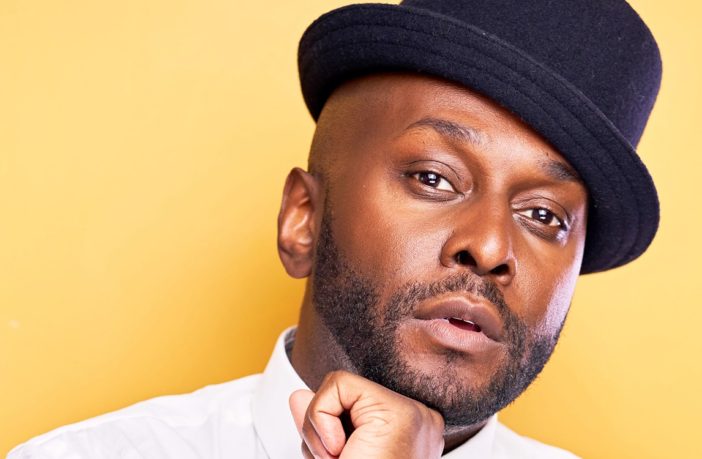Chicken & Biscuits is back! The hilarious tale about the Jenkins family Christmas, written by playwright Douglas Lyons, opened Friday night on with the Front Porch Arts Collective, currently in residence at the Huntington Theatre in Boston. But that’s not the only production being staged by the Black-owned theater company. The Collective is also doing a reading of Lyons’ newest production Invisible.
Lyons is also the writer of Beau the Musical, which just completed a sold-out run at the Dances With Films New York City Festival. Here, the playwright shares details of his latest productions with EBONY and why Black theater needs a lot more joy in the mix.
EBONY: It must be thrilling to see your Broadway play Chicken & Biscuits being performed by Black theatre groups around the country.
Douglas Lyons: Yes! Chicken & Biscuits is a mixture of real-life stories and people I’ve met and a small part of my family history. Something that I always speak about is bringing joy into the theater. Black stories are mostly applauded when there is trauma, pain, strife and oppression. It is rare for our joy to be center stage. So I’ve made it my motto to tell Black stories empowering women and queer stories. It’s catching fire in the way that I dreamt it and doing exactly what I thought it could do. There are audiences who want to come out to the theater, but they’re tired, I think, of seeing themselves in pain. I see Chicken & Biscuits as a movement that is giving a breath of fresh air and new energy to a generation that can come out and see themselves as happy as they are in their actual life, not just as the theater has portrayed them to be.
Tell us about your new play Invisible.
It’s a sci-fi comedy where two Black women get superpowers after they get high on laced weed. Imani and Jade are roommates and best friends, and after a rough job interview, Imani wants to get high. They don’t realize what they’re smoking is laced with something else, and it takes them on this hallucination. They are able to manipulate the past where Black women actually had no voice. That teaches them a little bit about their own superpowers in their actual lives. It’s a bit meta. The Front Porch Arts Collective is doing a festival of my work. It’s an honor to be working with a Black-owned theatre company outside of New York and really focusing on the work as it was meant to be heard.
And in the middle of all this, you wrote Beau the Musical.
I saw a friend of mine at Rockwood Music Hall in New York City, and in the middle of the set, he told a story about his grandfather who was living in the sticks of Salt Lake City, Utah. My friend would spend summers with this man while the rest of his family went away, and he fell in love with this man. And I just fell in love with the man too; the way my friend talked about his grandfather was really special. I started playing around with this idea of what if there were band members/actors retelling the story, quadruple threats who would have to sing, dance, act and play instruments, what would that look like? It started as an exploration and then it became a clear story. I’m very organic in the building of plays. I’ll write 10 pages, have table reads and use actors in the work. That’s how Beau was built.
And now it’s a musical movie.
We went to the Adirondack Theatre Festival in Glens Falls, New York, and it was very successful. We then recorded an album with Sony Masterworks. During the pandemic, I met producer Hunter Arnold who helped to bring together this film, which we shot in August 2021, right as Chicken & Biscuits was going to Broadway. It has become a queer coming-of-age story about self-love, music and legacy.
What themes are you exploring in Beau?
It’s about how we can heal. When a family is bruised, it can ultimately heal itself if it really wants to. After seeing the film and the response—hearing tears in the audience—I was like, “Oh, I think we actually did it.” It’s a love letter to love yourself, whatever that may be, whoever that may be, and to know that you can come out on the other side.
What a lot of people may find interesting is that you wrote a story that doesn’t have a Black lead character.
I had a friend approach me after one of the Beau concerts and ask, “Why aren’t they Black?” They can be Black. There was a reading where the mother was Filipino. There have been readings where the stepfather was Black. I’m not creating colorless theatre, obviously. But this piece is about the human spirit. All writers of all colors and Black writers should be allowed to write the human spirit. And that’s what I wanted to capture in Beau. I would love to see a Black family or Asian family take on this story. We’re really dealing with dynamics, so I can write anything. I’ve written about Jewish women, and I’ve written for kids. I write my imagination, and no one in this world will stop me from that.
See Chicken & Biscuits, part of the Front Porch Arts Collective residency at Huntington Theatre, through January 8, 2023.



